In 2018, Amber Heard wrote an op-ed in the Washington Post stating that she was a survivor of domestic abuse, and this created headlines.
“In the op-ed, headlined “I spoke up against sexual violence — and faced our culture’s wrath. That has to change,” Heard never mentioned Depp, but she referred to herself as “a public figure representing domestic abuse.”
“In the op-ed, headlined “I spoke up against sexual violence — and faced our culture’s wrath. That has to change,” Heard never mentioned Depp, but she referred to herself as “a public figure representing domestic abuse.”
Image Source: Marca
In March 2019, Depp filed a defamation lawsuit against Amber Heard and sued her for fifty million dollars, stating that it affected his work drastically and had led to overall damage to his reputation. The case continues to get more challenging, as both Depp and Heard explain in detail their experience with violence and domestic abuse. It becomes difficult to see who is speaking the truth. After the trial was streamed live and has been since the court hearing started, people have begun to take sides, and it has taken the internet by storm. While some believe the accusations Depp has made, some seem to side with Amber Heard as she explains in gory detail how she was physically and sexually abused by Johnny Depp right after their marriage.
Also read: Mental Health Is Not An Aesthetic: Fighting The Uphill Battle Against Bipolar Disorder
While some believe the accusations Depp has made, some seem to side with Amber Heard as she explains in gory detail how she was physically and sexually abused by Johnny Depp right after their marriage.
Videos are surfacing all over the internet, where people accuse Amber Heard of being fake and a liar. Self-proclaimed experts dissect her body language as she gives her testimony, and people mock and abuse her for diluting the experiences of “real” DV survivors. This case, as complex as it seems, has also raised serious questions about what makes a survivor “real” enough to be believed. However, in recent trials where a psychologist gave her testimony regarding Amber Heard’s mental illness, she went on to explain in great detail how people with the said disorder behaved, which majorly demonized an entire community of those suffering from it and not only Amber Heard.
Though regular testimonies from witnesses and the entire courtroom proceedings have piqued our interest without any doubt, people have become more curious about the diagnosis that Amber Heard has been given by the professionals. BPD. Borderline Personality Disorder is a cluster B personality disorder that affects a person’s interpersonal relationships and sense of identity.
I started watching the courtroom events in the true sense a few days ago. I kept clicking one video after the other on YouTube, hearing what doctors, security personnel, and other witnesses had to say. But what comes as a shock and also induces anxiety in me is this one shared opinion by people commenting on these videos that people suffering from BPD are inherently abusive.
Also read:Trust Me, Therapy Helps: Notes From A Recent Believer

I was diagnosed with BPD last year after being treated for depression for four years. After trying various antidepressants and increasing their dosage regularly, I wasn’t getting any better. So I did what any person with the bit of hope of getting better would do. I changed my doctor and waited for a miracle to happen. The only miracle that happened was that the new medicines seemed to work for me. But as soon as I was told that the symptoms were indicative of BPD, I suffered this huge identity crisis because all these years, I had made myself believe that I was indeed suffering, and this is who I was: a girl suffering from clinical depression. I chose relationships based on this identity and turned to poetry for finding solace, writing about things that people with depression go through.
Videos are surfacing all over the internet, where people accuse Amber Heard of being fake and a liar. Self-proclaimed experts dissect her body language as she gives her testimony, and people mock and abuse her for diluting the experiences of “real” DV survivors. This case, as complex as it seems, has also raised serious questions about what makes a survivor “real” enough to be believed.
Even though I was as lost as ever, I somehow knew that everything that happened to me was because I was depressed. I would often tell my then psychiatrist that I was afraid of getting better because I didn’t know who I would be without depression.
But as this new doctor immediately recognized my symptoms and my suicidal ideations, he was very affirmative of the fact that it was indeed BPD. I didn’t know what to think then. I didn’t know what to think of myself anymore, or those years of constantly believing that I was depressed and only depression made me drop out of college. I didn’t know what to think of all those poems that I had written explaining my pain. It seemed like a clean slate to me, and I was without any tether to keep myself sane. I was anxious, reluctant, and confused. But when the medicines seemed to work, I was more afraid than ever. It suggested that all those years of being constantly numb, demotivated, harming self, and planning suicide were symptoms of a disease that was even more stigmatized than the mental illness that I had previously made peace with.
I listened to the findings of that doctor who diagnosed Amber Heard, and as she explained how “borderlines” reacted, perceived personal relationships, sought attention, intensively feared abandonment, and had their highs in which they idealized someone to lows where they hated the same person immensely, I was left thinking if I had been doing the same thing over the years. I did idealize people I met, tried to impress them, and held them in high regard, and any minor inconvenience would lead me to hate them. It made sense why all those friendships with people I had grown up with didn’t last long in adulthood.
However, in recent trials where a psychologist gave her testimony regarding Amber Heard’s mental illness, she went on to explain in great detail how people with the said disorder behaved, which majorly demonized an entire community of those suffering from it and not only Amber Heard.
As I scrolled through the comment section, I saw people sharing their own stories of how they were abused, either physically or emotionally, by someone suffering from BPD. People who had been in the mental health field for years shared how they would any day treat a schizophrenic than a person with BPD. And people agreed. It was always a person with BPD as an abuser than a victim. A lot of them hailed the psychologist that gave testimony for Johnny Depp. She became an instant hero for people, and people praised her for her “courage” to speak up the truth regarding BPD.
It hurt, to be honest. It made me think if people around me were victims of me, whether I am the root of the problem or the problem itself. My hands trembled as I tried to gather some courage to reply to those comments, but I couldn’t find any because I knew there were many people who would not understand at all. I could feel my arms losing their strength and my head aching. I always had abandonment issues. I had begged people to stay and constantly texted them after they lashed out at me for being insane. I have trouble moving on. I have felt neglected ever since I received my first diagnosis. But these were just symptoms of a disease so terribly demonized.
This doesn’t mean that people with mental illness of any kind get a free pass to abuse someone. But looking at people and labelling them who they are with their disease (what I have been doing to myself all these years) robs them of a chance of getting proper treatment, respect, and acknowledgement. People commit crimes because they choose to, not because crime is a side effect of a mental illness, in this case, BPD. I firmly believe that crimes, irrelevant to their nature, should and must not be excused. But when has associated a mental illness with violence helped people.
Yet like every other person suffering from any mental illness who needs validation, I search for a “free MMPI 2 test”. Of course, it isn’t available for free. It is a licensed test done by qualified professionals. But I find a website claiming to do it for free, and I click on it instantly because I want to make myself believe that I am not a bad/inhumane/ demonic person. I need this reassurance. So I go through the next 104 questions and wait for the results that say I am 100% depressed, 30% paranoid, and 25% introverted, but I see another term that says 86% valid. Does this mean I am valid, or is the test? I don’t know. But I do remember all the times I was called insane, delusional, laughed at, mocked for being too emotional, and told that nobody would choose me ever again.
I have carried this shame ever since. Even at family weddings, functions, and gatherings because I knew I was rejected by people, cousins, aunts, trusted doctors of family, mocked, and treated like I deserved all of this. And now, with this case, this taboo has become even stronger. That we people deserve all this pain because an alleged abuser has the same disease.
People with BPD aren’t demons as it was once believed. There are no devil forces working inside our minds.
It hurt, to be honest. It made me think if people around me were victims of me, whether I am the root of the problem or the problem itself. My hands trembled as I tried to gather some courage to reply to those comments, but I couldn’t find any because I knew there were many people who would not understand at all. I could feel my arms losing their strength and my head aching. I always had abandonment issues. I had begged people to stay and constantly texted them after they lashed out at me for being insane.
I have seen so many Instagram influencers pretending to be woke, who casually throw words like “go get a therapy,” “get yourself checked by a psychiatrist, “or “you need mental help” when they confront people different from them. A lot of people use words like “Oh, he/she is a psychopath” while referring to our exes, or have seen people saying “He is such a narcissist” for someone clicking a lot of selfies. People aren’t just psychopaths/ narcs/borderlines. This is a mere appropriation of diseases you haven’t experienced but have seen in movies or in cases like this trial.
People have struggled to fight the intense shame that comes with being mentally ill, more so with cluster B disorders. They have never found a sense of belongingness in a world constantly trying to label them as violent/ abusers/ cheaters/ liars. Yes, a crime committed by anyone should be punished, but we haven’t ever heard someone saying, “Oh, he is such a neurotypical, it was expected of him.” If your idea of normalcy is different from others, it should not be generalized, but these differences should be accommodated so that every person finds space in this world regardless of their disorders.
Maybe Johnny Depp and Amber Heard’s case will end with a verdict. But the stigma against BPD will continue regardless. And even though some may find it entertaining and even find it easier to believe that a situation like this is bound to happen when living with “borderlines, “one must always take a step back and analyse. Mental health diseases exist on a spectrum, and every individual has a different experience and different ways in which these disorders exhibit themselves. How a person copes with it depends not only on the medical treatments but also on support systems, family, friends, and environment, along with genetic and physical factors.
I don’t know if I am the only one wondering if this is how things are supposed to be. If we (people with BPD) deserve the treatment we get from society, if I am over-analysing everything (which most of you will think), but a little love and kindness go a long way. There is no one mascot of BPD and if Amber Heard is what represents BPD, then so is Marsha Linehan, who developed DBT, which continues to save people suffering from various mental disorders.
The Amber Heard and Johnny Depp case will become the news of the past after some time as people get tired of getting a serotonin boost from someone else’s issues. Perhaps, they will still continue to take sides regardless of the final verdict, and that is bound to happen in high-profile cases like these. Maybe the doctor who testified for Johnny Depp will get her long-due raise or a spike in the number of patients that visit her because people want to be seen by such people who have been labelled as a harbinger of the supposed truth. But Nobody will ever care to ask a question about those who face isolation and intense loneliness that comes with suffering from BPD. Nobody will raise a voice for those who get abused because they have BPD. No such cases will be reported in mainstream media. And what worries me the most is how the people getting diagnosed for the first time will react to it or against it because, let’s be honest here, our prejudices get stronger when we find people saying the same thing over and over again. Regardless of who wins this defamation case, or the said amount of money, it is going to affect the DV survivors and those who suffer from cluster B disorders, both. We still haven’t moved in the direction where mental illness is actively talked about. We may make conspiracy theories against Heard or Depp, but the truth is they both chose violence not because Heard had mental health issues or Depp had problems with substance abuse, but because they simply made an active decision to abuse each other.
But Nobody will ever care to ask a question about those who face isolation and intense loneliness that comes with suffering from BPD. Nobody will raise a voice for those who get abused because they have BPD. No such cases will be reported in mainstream media. And what worries me the most is how the people getting diagnosed for the first time will react to it or against it because, let’s be honest here, our prejudices get stronger when we find people saying the same thing over and over again. Regardless of who wins this defamation case, or the said amount of money, it is going to affect the DV survivors and those who suffer from cluster B disorders, both.
Even though our traumas and past experiences do play a role in shaping our personalities, people do not tend to commit crimes out of their unconscious minds. It is always a known choice while being completely aware of the repercussions regardless of their diseases, physical or mental.
Bharti is a 24-year-old student currently pursuing her degree in Data Science. She has been published in magazines like aaduna, oc87recoverydiaries.org, the sunflowers collective and is a part of an upcoming anthology, The Yearbook of Indian Poetry. She lives in a small village in Shimla named Hatkoti. She finds solace in poetry and loves cats. She can be found on Instagram.
Featured image source: Pinkvilla, Clinical Trials Arena






